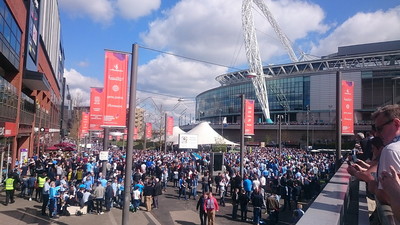
The EFL Trophy is a cup competition primarily for the 48 clubs playing in England’s League One and League Two but also including 16 under-21 category 1 academy teams from the Premier League and Championship.
The competition gives teams which may not get to the later stages of the FA Cup or EFL Cup a chance to play in a Wembley final and get their hands on some silverware.
Although officially the EFL Trophy, this competition tends to be known by their title sponsors. In the past this cup has been called the Auto Windscreens Shield, the LDV Vans Trophy, the Johnstone’s Paint Trophy and is currently the Papa John’s Trophy.
List of EFL Trophy Winners By Year
| Season | Winner | Score | Runner Up |
|---|---|---|---|
| 2022–23 | Bolton Wanderers | 4-0 | Plymouth Argyle |
| 2021–22 | Rotherham United | 4-2 (a.e.t.) | Sutton United |
| 2020–21 | Sunderland | 1-0 | Tranmere Rovers |
| 2019–20 | Salford City | 4-2 (pens) | Portsmouth |
| 2018–19 | Portsmouth | 5-4 (pens) | Sunderland |
| 2017–18 | Lincoln City | 1-0 | Shrewsbury Town |
| 2016–17 | Coventry City | 2-1 | Oxford United |
| 2015–16 | Barnsley | 3-2 | Oxford United |
| 2014–15 | Bristol City | 2-0 | Walsall |
| 2013–14 | Peterborough United | 3-1 | Chesterfield |
| 2012–13 | Crewe Alexandra | 2-0 | Southend United |
| 2011–12 | Chesterfield | 2-0 | Swindon Town |
| 2010–11 | Carlisle United | 1-0 | Brentford |
| 2009–10 | Southampton | 4-1 | Carlisle United |
| 2008–09 | Luton Town | 3-2 | Scunthorpe United |
| 2007–08 | Milton Keynes Dons | 2-0 | Grimsby Town |
| 2006–07 | Doncaster Rovers | 3-2 | Bristol Rovers |
| 2005–06 | Swansea City | 2-1 | Carlisle United |
| 2004–05 | Wrexham | 2-0 | Southend United |
| 2003–04 | Blackpool | 2-0 | Southend United |
| 2002–03 | Bristol City | 2-0 | Carlisle United |
| 2001–02 | Blackpool | 4-1 | Cambridge United |
| 2000–01 | Port Vale | 2-1 | Brentford |
| 1999–00 | Stoke City | 2-1 | Bristol City |
| 1998–99 | Wigan Athletic | 1-0 | Millwall |
| 1997–98 | Grimsby Town | 2-1 | AFC Bournemouth |
| 1996–97 | Carlisle United | 4-3 | Colchester United |
| 1995–96 | Rotherham United | 2-1 | Shrewsbury Town |
| 1994–95 | Birmingham City | 1-0 | Carlisle United |
| 1993–94 | Swansea City | 3-1 | Huddersfield Town |
| 1992–93 | Port Vale | 2-1 | Stockport County |
| 1991–92 | Stoke City | 1-0 | Stockport County |
| 1990–91 | Birmingham City | 3-2 | Tranmere Rovers |
| 1989–90 | Tranmere Rovers | 2-1 | Bristol Rovers |
| 1988–89 | Bolton Wanderers | 4-1 | Torquay United |
| 1987–88 | Wolverhampton Wanderers | 2-0 | Burnley |
| 1986–87 | Mansfield Town | 5-4 | Bristol City |
| 1985–86 | Bristol City | 3-0 | Bolton Wanderers |
| 1984–85 | Wigan Athletic | 3-1 | Brentford |
| 1983–84 | AFC Bournemouth | 2-1 | Hull City |
Tournament Background
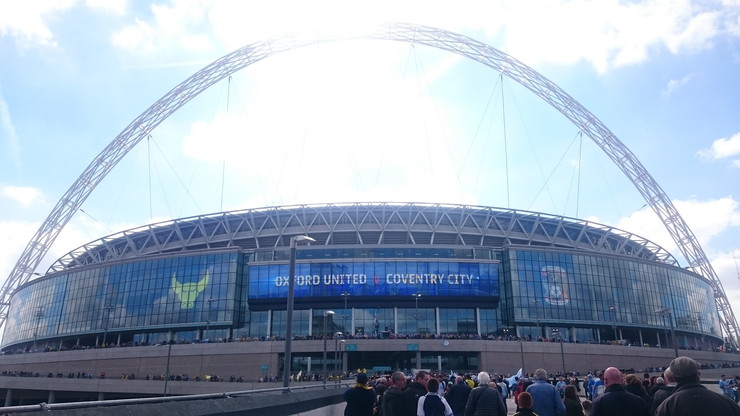
Every year, each club in League One or League Two enters the draw for the two most prestigious cups in England, the FA Cup and the League Cup. The chances of winning either of these are minuscule though given the huge gap between these divisions and the Premier League. Of course, there will always be upsets in the earlier stages but for a lower league side to string three or four upsets together in a row, this does not really happen in the modern game.
This is why the EFL Trophy is so valuable as it gives all the teams within these two divisions a genuine shot at some respected silverware. Although it no longer solely involves third and fourth tier sides, they do still form the vast majority of the teams involved each year. Although it may not be as major or prestigious as the likes of the FA Cup, it is still a competition any fan of a lower league club would love to win. Teams may not always take it too seriously in the early stages but by around the time of the quarter-finals, it does tend to grow significantly in importance.
Eligibility Rules

Even in more major competitions like the FA Cup and League Cup, some managers have become the source of controversy by naming a completely changed starting eleven. Some managers would no doubt be tempted to do this for the EFL Trophy too but competition rules can make wholesale changes a little more challenging, albeit not impossible in some cases. For this tournament, across each stage of the competition, a side must name at least four ‘qualifying’ outfield players. For any Football League club, a player will count as qualifying if they meet any of the four criteria provided below.
- Any player that started the previous first team fixture or starts in the following match
- Any player that is among the top 10 most active (in terms of appearances) at their club for first team fixtures during the current season
- Any player that has 40 of more first team appearances or international equivalents (can be across clubs and season)
- Any player that is on loan from a Premier League or club or an EFL Club that has a Category One academy
In the past, teams have been slapped with a fine for not abiding by these rules. Within three months of the criteria being set, the EFL had dished out 12 penalties to rule-breakers. Luton Town were stung with the maximum fine of £15,000 for their group stage games as they had absolutely no desire to listen to the rules. Rather than showing such a brazen disregard for the regulations, Bradford tried to be smarter and subbed a qualifying player off after just three minutes. The EFL took a dim view of this though and fined them £3,000.
As for the academy teams involved, they only have two rules to abide by. One is that at least six starting players must be have been aged under 21 on 30th June the year the competition begins. For the 2021/22 tournament for example, the cut off was 30th June 2021. The other rule is that there can only be a maximum of two players on the team sheet that are both over 21 and have made 40+ senior appearances. Rather than facing a fine, failure to follow these rules can lead to a points deduction. In the 2021/22 EFL Trophy, West Ham U21 lost three points for fielding an ineligible player against Gillingham, something that saw them move from first in the group to third.
Academy Squad Match Boycotts

This competition is generally speaking not unpopular among supporters. The attendance across finals has been incredibly healthy, far more than any equivalent competition in most other countries would manage. Many fans of lower league clubs, however, took real issue with the Premier League academy squads being invited to take part in the competition. Although none has managed to reach a final (as of 2022) let alone lift the trophy, it still is a contentious point as their presence remains an unwelcome one.
Many fans, therefore, choose to boycott their side’s matches against the academy teams. This has produced some especially low attendance figures with one example coming at Burton when only 202 people showed up to see the Brewers lose to Middlesborough’s under 21 team in 2018. It is worth pointing out that 60% of EFL members approved the introduction of these Category 1 academy teams but clearly they were not in sync with the sentiment of their supporters on the matter.
Tournament Format
Although this has always been a tournament for teams on the third and fourth level of the English footballing pyramid since the 2016/17 season the competition has included 16 Category One academies. These are typically Under 21 sides from Premier League clubs although occasionally Championship U21 sides feature, usually from a side relegated the previous season. These academy sides are included on an invitation basis and they do change year on year, not just because clubs can lose Category One status. With these 16 academy sides combined with the 48 Football League teams in League One and League Two, this means 64 clubs total take part in the competition.
Group Stage
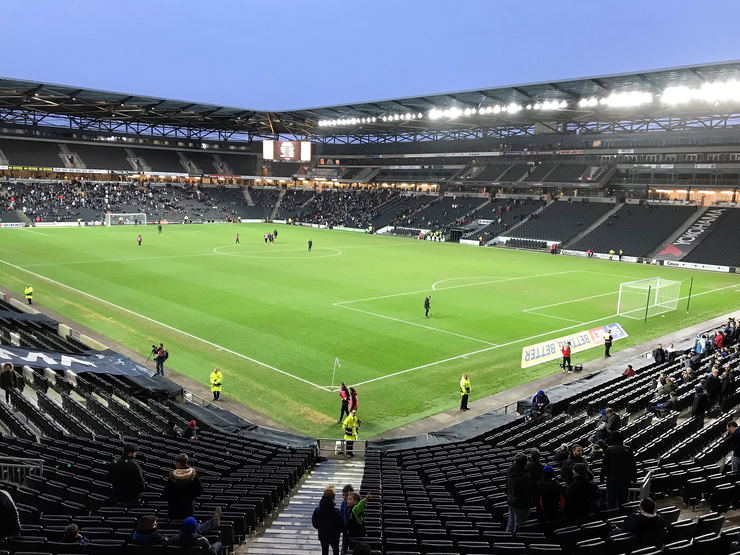
The EFL Trophy begins with 16 groups of four teams that include a trio of EFL clubs and one invited academy side. Each team faces one another just once, meaning the group stages feature just three games. Each EFL team will play two of their matches at home because rules stipulate the academy sides must play all their group fixtures away. Interestingly, despite it being a group round, no match is permitted to end as a draw. Whenever a match is level after 90 minutes, the match heads straight to penalties. Winning a game on penalties is worth two points, as opposed to three points for a regular time win. The team that loses the penalty shootout is awarded one point rather than going home empty-handed.
The two teams that occupy the top two spaces in the group by the end of the group stages progress to the next round while the rest are eliminated. If two (or more) teams are level on points in a group then goal difference will become the deciding factor. If this happens to be the same then goals scored will be looked at.
Knockout Rounds
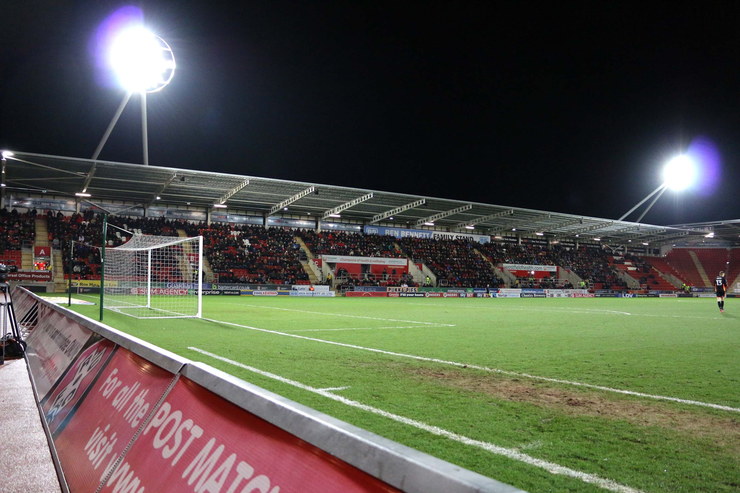
As 16 clubs from the northern section and 16 clubs from the southern section survive from the group stages, it enables the EFL to keep this regional divide in place for the start of the knockouts. This is precisely what they do too with the first knockout round (round two) and the second knockout round (round three) involving two separate north/south draws. Only in the quarter-finals when there are eight teams remaining does the competition become mixed, geographically speaking.
As with the group stages, the knockout rounds are also keen to avoid extra-long matches and possible fixture congestion. This means all matches are one-legged, there are never any replays and matches head straight to penalties rather than extra time whenever there is a tied scoreline. Naturally, this means the entire competition sees a considerable number of shootouts so it is not an unwise thing for teams to practice before any knockout match.
The Final
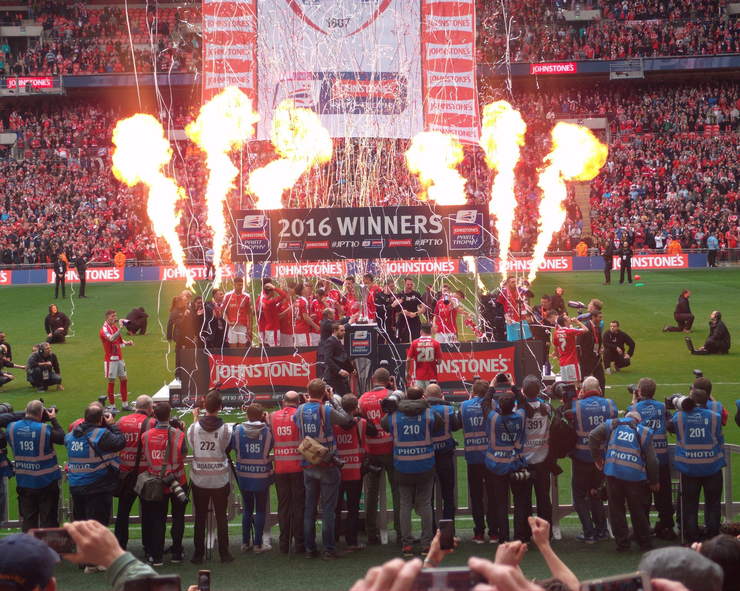
The only exception to the usual knockout format, as is so often the case with cup competition, is seen during the final. For the last game of the competition, a 30-minute period of extra time will be called upon in the event of a draw. If there is still no winner after this then players will need to try their luck, in turn, firing home from 12 yards. The final has always taken place at a completely neutral venue apart from the first-ever EFL Trophy final which took place at Boothferry Park, then home of Hull City. This slightly unusual pick only occurred because Wembley, which had been scheduled to host, had its pitch damaged by a Horse of the Year Show. Despite having home advantage though, the Tigers succumbed to a 2-1 defeat to Bournemouth.
The old Wembley pitch did manage to host all other finals up until 2000 though, at which point it was closed down. In the meantime, while the new Wembley was being built, the Millennium Stadium in Cardiff stepped in as hosts. Subsequently, the final spent seven years in Wales before moving back to the English capital. Since being at the revamped Wembley, attendance figures for the EFL Trophy final have been very impressive. No fans were allowed to spectate in 2020 or 2021 due to the global health issues but prior to this, the average attendance had been over 57,000. A new record was set in 2019 too when two former Premier League giants, Portsmouth and Sunderland went head to head. For this hotly anticipated clash, the official attendance figure was a massive 85,021.
Previous Formats
 As mentioned above, this competition has not always welcomed academy sides to take part. It has in the past though invited a selection of National League (fifth tier) teams in order to make up the numbers. Between 2000/01 and 2005/06, this competition saw between eight and 12 teams from what was then known as the Football Conference. After this point, the EFL Trophy went back to being exclusively for third and fourth tier teams, until of course the contentious rule change in 2016/17.
As mentioned above, this competition has not always welcomed academy sides to take part. It has in the past though invited a selection of National League (fifth tier) teams in order to make up the numbers. Between 2000/01 and 2005/06, this competition saw between eight and 12 teams from what was then known as the Football Conference. After this point, the EFL Trophy went back to being exclusively for third and fourth tier teams, until of course the contentious rule change in 2016/17.
When operating with just League One and League Two clubs, so 48 teams in total, during this interim period, the competition only featured knockout rounds, so not the league system we see today. As is the case currently, the draw would be split into north and south but eight teams from each half of the country would get a bye into the second round. The remaining 32 teams in total would play out a one-legged first round fixture that headed to penalties in the event of a draw. The victors would then join the teams receiving a bye in the second round where another 16 knockout fixtures would take place.
In these years the regional divide was not scrapped at the quarter-final stage, instead you had a regional quarter-final, semi-final and two-legged (home and away) final. The respective winners of the north and south final would then meet in the actual final, producing the only mixed-area clash of the entire competition. Having this regional divide right up until the final match was far from a novel rule either as it had been in place since the competition was founded in 1982. Only following the rules changed in 2016/17 were teams from across the country able to meet at an earlier stage in the tournament.
To begin with the competition also only featured clubs in the third and fourth tiers of English football, then known as the Third Division and Fourth Division. There were no invitations extended to youth teams or fifth tier clubs so it was more similar to the system seen between 2006/07 and 2015/16. Unlike between these years though, early editions of the EFL Trophy, or rather Associate Members Cup, started off with a small group stage with each group featuring just three teams. Only group winners would survive and head into the regional knockout stages.
With only two group stage games to play, it was not uncommon for teams to end up level on points. Usual tie-breaker rules of goal difference and goal scored applied but this was not always enough. In 1985/86, for example, Doncaster Rovers, Mansfield Town and Notts County all won their home game 1-0 (meaning they lost their away game 0-1). With no way of separating them, or at least none built into the rules, the trio had to play each other again. This group-into-knockout system lasted until the 1995/96 with the tournament switching to being a pure knockout contest afterwards.
Most Successful Clubs
One of the difficulties in winning this tournament regularly is being consistently eligible for it. The leading League One sides have the best chance on paper, but many of these end up getting promoted at the end of the season. Indeed, several clubs with two or three EFL Trophy wins play in a higher division currently, meaning they have no possibility of adding to their tally, until they are relegated anyway. Despite this competition seeing involvement from both National League teams (previously) and Under 21 teams from the Premier League/Championship (currently), this trophy has always been won by a League One or League Two side.
The table below includes all teams (as of 2021) with more than one EFL Trophy win. All other winners (21) have conquered the tournament just once.
EFL Trophy’s Most Successful Clubs
| Team | Wins (Years) | Runners-Up (Years) |
|---|---|---|
| Bristol City | 3 (1986, 2003, 2015) | 2 (1987, 2000) |
| Carlisle United | 2 (1997, 2011) | 4 (1995, 2003, 2006, 2010) |
| Birmingham City | 2 (1991, 1995) | 0 |
| Blackpool | 2 (2002, 2004) | 0 |
| Port Vale | 2 (1993, 2001) | 0 |
| Stoke City | 2 (1992, 2000) | 0 |
| Swansea City | 2 (1994, 2006) | 0 |
| Wigan Athletic | 2 (1985, 1999) | 0 |
Only Bristol City have managed to taste EFL Trophy glory on more than two occasions. There are some eligible teams that could match their record with just one more victory though. As for final appearances, no team can top Carlisle’s tally of six, although sadly for the northern side the majority of their trips to Wembley (and the Millennium Stadium) have ended in tears. Their record at the final stage is far from the worst this competition has seen mind you. Both Southend and Brentford have reached the final three times but painfully failed to win on any occasion. You also have Bristol Rovers, Oxford United, Shrewsbury Town and Stockport County that have twice finished runner-up but never as the champions.
Sponsorship
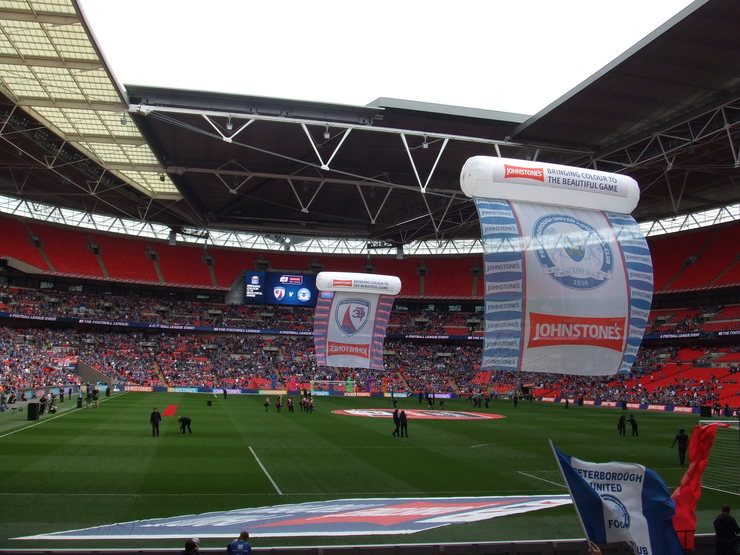
This tournament is often referred to by its sponsored title and this is something that has changed frequently over time. There was no sponsor during the first year of its existence but since then it has always run under an extra name. Some of these sponsored names tend to stick among fans so you may well still hear them, even though the sponsorship agreement has long expired.
EFL Trophy Sponsors – 1984/85 – 2022/23
| Years | Sponsored Title |
|---|---|
| 1984/85 – 1986/87 | Freight Rover Trophy |
| 1987/88 – 1988/89 | Sherpa Van Trophy |
| 1989/90 – 1991/92 | Leyland DAF Cup |
| 1992/93 – 1993/94 | Autoglass Trophy |
| 1994/95 – 1999/00 | Auto Windscreens Shield |
| 2000/01 – 2006/07 | LDV Vans Trophy |
| 2007/08 – 2015/16 | Johnstone’s Paint Trophy |
| 2016/17 – 2018/19 | Checkatrade Trophy |
| 2019/20 | Leasing.com Trophy |
| 2020/21 – 2022/23 | Papa John’s Trophy |
EFL Trophy History
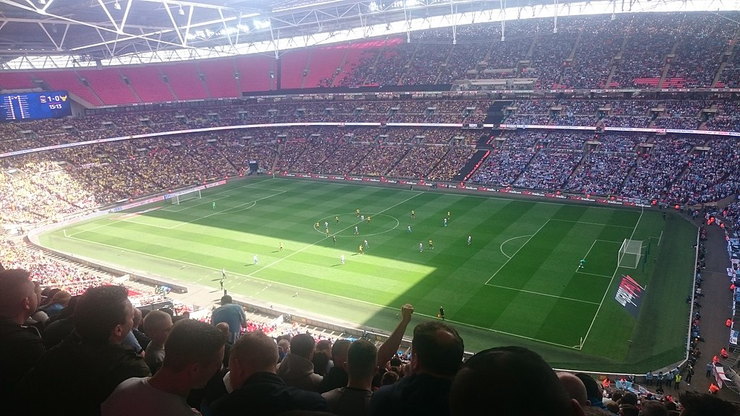
As far as English cup competitions go, the EFL Trophy is reasonably modern. It was first introduced during the 1983/84 season although back then it went by the less catchy title of the Associate Members’ Cup. It had some similarities to the Football League Trophy, which had run the two years prior, but this was a brand new event and considered a separate honour. The Associate Members’ Cup name stuck for a decade after which point it was changed to the Football League Trophy. This change in 1992 was at least in part triggered by the foundation of the Premier League, leaving the Football League responsible for three, rather than four tiers of English football.
A further name change followed in 2016 and it is here when the competition gained its current title of the EFL Trophy. This was part of some major overarching rebranding that saw the Football League become the English Football League, with the abbreviation of EFL encouraged for more everyday use. At the same time, the EFL also introduced several new rule changes to the EFL Trophy, including controversially, to bring in 16 Premier League and Championship Category One academy teams. A year later, the EFL dictated that penalty shootouts (of which this competition sees many) must follow the ABBA system. This change was very short-lived though with the traditional ABAB system returning a year later.